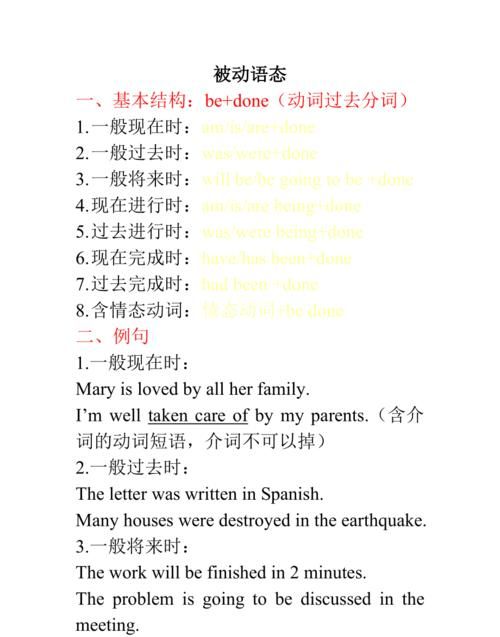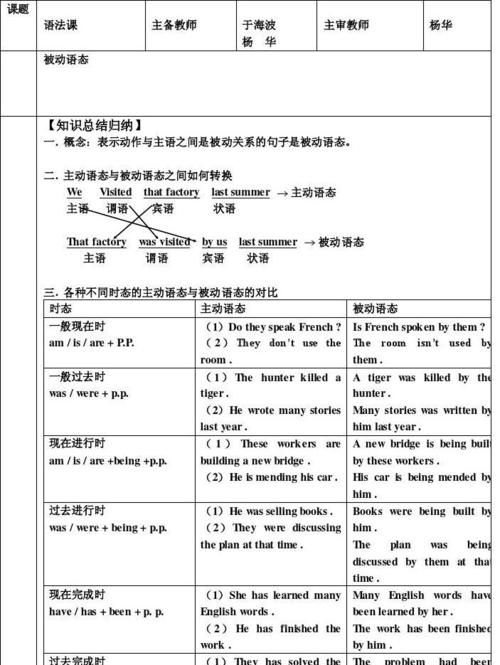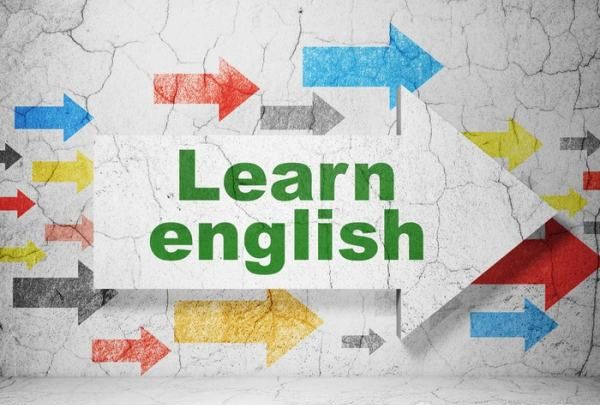本文目录
英语被动语态用法总结高中
英语的被动语态由“助动词be+过去分词”构成,其中be有时态、人称和数的变化。本文中,我整理了被动语态的相关知识,欢迎阅读。
被动语态的结构
被动语态的结构为“助动词be+及物动词的过去分词(p.p)”。被动语态的不同时态是通过be的时态变化来表示的,其人称和数方面应与主语保持一致。其具体变化为:
一般现在时:am/is/are+p.p.
一般过去时:was/were+p.p.
一般将来时:shall /will be +p.p.
现在完成时:have /has been +p.p.
现在进行时:am/is/are+being+p.p.
过去将来时:should /would be +p.p.
含情态动词的被动结构:情态动词+be+p.p.
九种时态的被动语态
例句
We are given a lot of homework to do. 我们有很多作业要做。
They were given a warm send-off. 他们受到热烈的欢送。
I think we are being followed. 我想有人在跟踪我们。
They told me that the case was being investigated. 他们告诉我案子正在调查。
The documents for which they were searching have been recovered. 他们找寻的文件已找到了。
He asked if Mary had been sent to hospital. 他问玛丽是否已被送进医院。
Check carefully, so any mistakes will be caught. 仔细检查一遍,把所有错误都找出来。
He knew he would be punished for it. 他知道他会为此受到惩罚。
以上是我为大家整理的被动语态的相关内容,希望可以帮助到大家。

高中英语被动语态知识点总结
被动语态是英语常考常用句型结构,这一个知识点也是我们必须要掌握的,下面就是我给大家带来的英语被动语态知识点 总结 讲解,希望能帮助到大家!
被动语态复习 ABC
A.熟记结构
被动语态的结构为“助动词be+及物动词的过去分词(p.p)”。被动语态的不同时态是通过be的时态变化来表示的,其人称和数方面应与主语保持一致。其具体变化为:
一般现在时:am/is/are+p.p.
一般过去时:was/were+p.p.
一般将来时:shall /will be +p.p.
现在完成时:have /has been +p.p.
现在进行时:am/is/are+being+p.p.
过去将来时:should /would be +p.p.
含情态动词的被动结构:情态动词+be+p.p.例如:
① Chinese ______ by the largest number of people.(选D。考查一般现在时的被动语态)
A.speak B.is speaking C.speaks D.is spoken
② The boy ______ to get supper ready after school.(选C。考查一般过去时的被动语态)
A.were told B.is telling C.was told D.tells
③ A lot of new roads ______ built in the west of China.(选B。考查含情态动词的被动语态)
A.must B.must be C.has D.have
B.明确用法
被动语态常用于以下两种情况:
1.不知道谁是动作的执行者,或者没有必要指出谁是动作的执行者;
2.强调动作的承受者。例如:
这棵树是那个男孩弄断的。
The tree ______ ______ by that boy. (填was broken)
C.熟练转换
1.将主动语态变被动语态的基本 方法 为:
①将主动语态的宾语作被动语态的主语;
②谓语动词变为“be+及物动词的过去分词”,并通过be的变化来表达出不同的时态;
③主动语态的主语变为介词by的宾语,组成介词 短语 放在被动结构中的谓语动词之后。(有时by短语可以省略)。
2.被动语态的一般疑问句是将一个助动词置于主语之前;否定句是在第一个助动词后加not;特殊疑问句的语序为:疑问词+一般疑问句。例如:
① You must throw the broken pottery away at once.
The broken pottery ______ ______ ______ ______ at once.(同义句) (填must be thrown away)
② Where did they grow vegetables?(改为被动语态)
Where ______ vegetables ______ ?(填were;grown)
D.注意特例
将主动语态变被动语态应注意几个特殊情况:
1.含双宾语的主动结构变为被动结构时,有两种方法:
①将间接宾语变为主语,直接宾语保持不变;
②将直接宾语变为主语,间接宾语用介词to或for引导。例如:
① He told us a story.(变被动语态)
→We were told a story(by him).或:A story was told to us by him.
② Her mother gave her a new pen.(变被动语态)(填was given to)
A new pen ______ ______ ______ her by her mother.
2.短语动词的被动语态:在变为被动语态时,要将短语动词视为一个整体,其后的介词或副词不能省去。例如:
① This dictionary mustn't ______ from the library.[D]
A.take away B.taken awayC.are taken away D.be taken away
② She will take good care of the children.(变被动语态)(填be taken good care of)
The children will ______ ______ ______ ______ ______ (by her).
3.含有复合宾语的主动结构变被动结构时,通常将宾语变为被动句的主语,而宾语补足语就成为主语补足语。注意:省略to的不定式作宾补时,不定式符号to必须补上。例如:
Someone saw him swim in Qianling Lake yesterday.(变被动语态)
He ______ ______ ______ swim in Qianling Lake yesterday.
(填was seen to)
4.不定式的被动结构:动词不定式的被动语态为“to be +过去分词”。例如:
The radio says a wild animal zoo is to ______ in our city.
A.be building B.build C.be built D.built [C]
5.以疑问代词开头的疑问句转换成被动句时要注意词序:应将主动句中的疑问代词改为介词by的宾语,但仍然放在 句子 开头。例如:
Who has broken the cup?(改为被动语态)
→By whom has the cup been broken?
E.注意区别
被动语态和过去分词作表语的区别:
1)含义不同:被动语态强调动作,重点说明动作由谁完成、怎样完成;而过去分词作表语通常用来描写情景,叙述人或事物的特征及所处的状态。试比较:
The window is broken.窗子破了。(系表结构)
The window is broken by him.窗子被他打破了。(被动语态)
2)用法不同:过去分词作表语时可以被 so,very,too等程度副词修饰,而被动语态则不能用so,very,too修饰,而需用much,very much,so much,too much修饰。试比较:
He was very interested in science.他对科学有极大兴趣。(系表结构)
I was so much surprised at the scene that I didn't know what to do.我被那种场面搞得大吃一惊,不知所措。(被动语态)
F.牢记(相关)句型
初中教材中与被动语态相关的句型有:
1.be covered with被……覆盖
2.be made of由……制作(发生物理变化) be made from由……制作(发生化学变化)
be made in由(某地)制造 be made by被(某人)制造
3.be used for被用来……
be used as被当作(作为)……来使用 be used to do sth.被用来做某事
4.It is said that...据说…… It is hoped that...希望……
It is well known that...众所周知……例如:
①—Your coat looks nice.Is it ______ cotton?[B]
—Yes.It's Shanghai.
A.made of;made by B.made of;made in
C.made for;made by D.made for;made in
② This machine is used ______ the room wet.[A]
A.for keeping B.as keeping C.keep D.to keeping
③ 据说在南京长江上又在建一座桥。
______ ______ ______ that ______ ______ is being ______ over the Changjiang River in Nanjing.
(填It is said;another bridge;built)

高中被动语态的用法归纳
被动语态的用法归纳如下:
构成
(1)助动词+be+及物动词的过去分词
(2)情态动词+be+及物动词的过去分词
现以动词ask为例,将一般现在时和一般过去时的被动语态列表如下
肯定式
否定式
疑问式

一般现在时
I am asked..
He/she is asked...
We/you/they are asked...
I am not asked...
He/She is not asked...
We/you/they are not asked...
Am I asked...?
Is he/she asked...?
Are we/you/they asked...?
一般过去时
I was asked...
He/She was asked ...
We/you/they were asked...
I was not asked...
He/Shewas not asked...
We/you/they were not asked
Was I asked...?
Was he/she asked...?
Were we/you/they asked...?
口诀
一般现在时、一般过去时用be +及物动词的过去分词,be有人称、时、数变。
完成时态have(has)done,被动将been加中间。
一般将来shall(will)do,被动变do为be done。
将来进行无被动,shall(will)be doing。
现在完成时,被动 have(has)been done。
现、过进行be doing,被动be加being done。
情、助、有、是妥安排,一律随新主语变。
否定助后加not,疑问一助置主前。
主语恰是疑问词,直陈语序主在前。
一般情助加be done,双宾多将间宾变。
复合宾语宾变主,宾补、主补相应变。
第二句“be有人称、时、数变”即be有人称、时态和单、复数的变化。“情助”是指情态动词和助动词“must,may,can,shall,will”等一律随新主语(多是主动句中的宾语)来变化。“疑问一助置主前”是说有两个助动词的话,应把主语放在第一助动词之后或把第一助动词置于主语之前。下面详细举例说明之:
主动语态变为被动语态例句:
一般现在时:
主:We believe him.
被:He is believed by us.
一般过去时:
主:He bought his children some pens.
被:Some pens were bought for his children by him.
一般将来时:
主:Everyone will know the truth soon .
被:The truth will be known by everyone.
现在进行时:
主:Mary is making a doll.
被:A doll is being made by Mary.
过去进行时:
主:They were carrying the hurt player.
被:The hurt player was being carried by them .
现在完成时:
主:He has received the letter.
被:The letter has been received by him.
过去完成时:
主:They had built ten bridges.
被:Ten bridges had been built by them
一般现在时/过去时
例:
1、主动:The children gave the foreign guests a warm welcome.
被动:The foreign guests were given a warm welcome by the children.
孩子们热烈地欢迎外宾。
2、
主动:People regard him as brilliant.
被动:He is regarded as brilliant by people.
人们都认为他很有才华。
以上两例都是一般时态用“be done”的事例,be有人称、时、数变,第三人称“foreign friends”是复数,时态一般过去时,所以“be done”就是“were given”,而“People regard him as brilliant”一句,被动后的“be done”就变成第三人称单数“is regarded”的形式了。
被动:
This speech was delivered by comrade Wang. (“was delivered”即为一般过去时的被动态)
这是王同志的讲演。
There was a serious train accident near the border. Two people were killed and twelve were injured.
边境发生非常严重列车事故,两人死亡,十二人受伤。
A person who is truly honest is called a straight arrow.
直言不讳的人才是真正诚实的人。
A note was passed up to the speaker.
有人给讲演者递上来一张纸条。
John was elected president of the class instead of Harry.
乔治被选为班长来代替亨利。
Volcanoes are described as active, dormant or extinct.
火山被分为活火山,休眠火山,或者死火山。
The soldier was killed, but the train was saved.
这位战士牺牲了,然而列车得救了。
He was thought to be clever but dishonest.
他被认为很聪明但不诚实。
The first zoological garden in the United States was established in 1874.
美国的第一个动物园是1874年建立的。
Families were often broken up; wives were taken away from their husbands and children from their parents.
家庭总是被拆散,丈夫失去妻子,父母失去孩子。
The information is urgently needed.
急需这个资料。
Most environmental problems exist because adequate measures for preventing them were not taken in the past.
多数环境污染问题的存在是因为过去没有采取适当的保护措施。
完成时态
“havedone”,被动将“been”加中间。
(过去完成时“had done”也包括在内)。
例:
1、主动:We have studied English for 3 years at the spare-time school.
被动:English has been studied by us for 3 years at the spare-time school.(“have”随新主语变为“has”)
我们已经在学校里学了三年英语了。
2、主动:They had produced 100 tractors by the end of last year.
被动:100 tractors had been produced by the end of last year.
到去年年底他们已生产出一百台拖拉机。
3、主动:They have set up a power station in their home town.
被动:A power station has been set up in their home town.
他们的家乡建立了一座发电站。
4、主动:They have warned us to be careful of rats.
被动:We have been warned to be careful of rats by them.
他们已提醒我们要注意老鼠。
5、主动:People have piled plastic bags full of rubbish in streets.
被动: Plastic bags full of rubbish have been piled in streets.
人们把装满垃圾的塑料袋子堆放在街上。
6、主动:We have used nuclear energy to produce electricity.
被动:Nuclear energy has been used to produce electricity by us.
核能被我们用来发电。
7、主动:No one has ever beaten him at tennis.
被动:He has never been beaten at tennis.
就网球来说还没有人是他的对手。
(“No one”涉及到全否定和部分否定问题,见否定一讲)
The person who owns the gun may try to deny that he has used it. But anyone seeing the smoke knows the gun has just been fired.
有枪的人可能会试图否认他开了枪。但是任何看到枪冒的烟的人都会知道他刚才开了枪。
Today is Cilia's wedding day, she has just been married to Bob.
今天是西丽亚的新婚日,她刚刚和鲍勃结婚。
The subjects of these lectures have been announced by the lecture committee.
演讲委员会已宣布了这些讲演的题目。
过去完成时也是一样:
主动:Somebody had cleaned my shoes.
被动:My shoes had been cleaned by somebody.
有人已把我的鞋子擦了。
主动:When I returned I found that they had towed (tow) my car away, I asked why they had done this and they told me that it was because I had parked it under a "No Parking Sign".
被动:My car had been towed away. I asked why this had been done and told that...it had been parked under a "No Parking Sign".
当我回来时,发现我的车被拖走了。我问他们为什么这么干。他们告诉我说因为我把车停在“禁止停车”的区域。
主动:They had build three ships by last December.
被动:By last December three ships had been built by them.
到去年年底他们已建造了三艘船。
Research had been centred on the improvement of natural building materials before synthetics were created.
合成材料造出之前,研究工作集中在改进天然建筑材料上。
He did not say if all those steel pipes had been examined.
他并没有说那些钢管是否都检验过。
After plastic had been created, engineers were given a much wide choice of materials.
塑料发明之后,工程师们在材料选择上有了更广阔的途径。
一般将来时
“shall(will) do”,被动变“do”为“be done”
即由“shall do”或“will do”变为“shall be done”或“will be done”。
例:主动:We shall build several big modern power plants in our city.
被动:Several big modern power plants will be built in our city.
我市将建立几座大型现代化的发电厂。
(“shall do”中的“shall”要随新主语变为“will”,“do”要变为“be done”。)
主动:I shall send my second boy to school next September.
被动:My second boy will be sent to school next September.
过年九月我将送我次子去读书。
主动:In order to fool people cheaps and swindlers will make such bricks out of lead covering the "lead brick" with gold.
被动:Such bricks will be made out of lead covering the "lead brick" with gold by swindlers.
砖块外面会被骗子们镀上一层金来做这样的“金砖”。
主动:They will ask you a lot of strange questions.
被动:You will be asked a lot of strange questions by them.
他们将问你许多怪题。
被动句中的“by”引出的宾语,一般说来,如果是人称代词你、我、他等,均可省略,“someone no one”不由“by”来引出。如果是名词不能省略,但当今英语也都可省略了。
主动:The Chinese people will make more space explorations in the future.
被动:More space explorations will be made in the future by the Chinese people.
中国人民在未来将进行更多的太空探索。
英语被动语态用法总结高中
英语被动语态用法总结如下:
被动语态的基本构成:主语 + be + 及物动词的过去分词。动词的执行者由介词 by 引出,往往可以省去。被动语态是动词的一种形式,有时态、人称和数的变化,这种变化体现在助动词 be 上。

英语中常用的十种被动语态:
1.一般现在时:主语 + am/is/are + 过去分词
English is taught in most schools in china.中国大多数学校都教英语。
2.一般过去时:主语 + was/were + 过去分词
The computer was put into operation in 1942.计算机于1942年投入运行。
3.一般将来时:主语 + shall/will + be + 过去分词
The sports meet will be put off.运动会将被推迟。
4.过去将来时:主语 + should/would + be + 过去分词
He said he would be loved if he loved others.他说只要他爱别人,自己就会被爱。
5.现在进行时:主语 + am/is/are + being + 过去分词

I'm afraid I am being followed.恐怕有人正在跟踪我。
6.过去进行时:主语 + was/were + being + 过去分词
The hospital was being built when I came last time.上次我来时,这家医院正在修建中。
7.现在完成时:主语 + have/has + been 过去分词
Many new buildings have been completed in the city.这座城市里已经建成许多新建筑。
以上就是关于被动语态知识点归纳与总结,英语被动语态用法总结高中的全部内容,以及被动语态知识点归纳与总结 的相关内容,希望能够帮到您。

